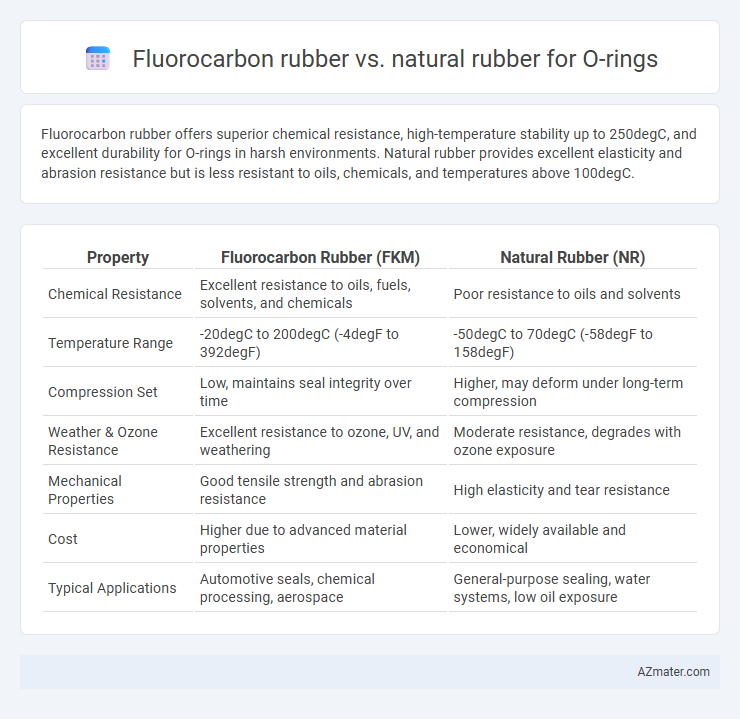Fluorocarbon rubber offers superior chemical resistance, high-temperature stability up to 250degC, and excellent durability for O-rings in harsh environments. Natural rubber provides excellent elasticity and abrasion resistance but is less resistant to oils, chemicals, and temperatures above 100degC.
Table of Comparison
| Property | Fluorocarbon Rubber (FKM) | Natural Rubber (NR) |
|---|---|---|
| Chemical Resistance | Excellent resistance to oils, fuels, solvents, and chemicals | Poor resistance to oils and solvents |
| Temperature Range | -20degC to 200degC (-4degF to 392degF) | -50degC to 70degC (-58degF to 158degF) |
| Compression Set | Low, maintains seal integrity over time | Higher, may deform under long-term compression |
| Weather & Ozone Resistance | Excellent resistance to ozone, UV, and weathering | Moderate resistance, degrades with ozone exposure |
| Mechanical Properties | Good tensile strength and abrasion resistance | High elasticity and tear resistance |
| Cost | Higher due to advanced material properties | Lower, widely available and economical |
| Typical Applications | Automotive seals, chemical processing, aerospace | General-purpose sealing, water systems, low oil exposure |
Introduction to O-Rings: Importance of Material Selection
O-rings require precise material selection to ensure optimal sealing performance under various chemical and temperature conditions. Fluorocarbon rubber (FKM) offers superior resistance to heat, oils, and chemicals compared to natural rubber, making it ideal for harsh industrial environments. Natural rubber provides excellent elasticity and tear resistance but lacks chemical and heat resistance, limiting its use in high-performance sealing applications.
Overview of Fluorocarbon Rubber (FKM)
Fluorocarbon rubber (FKM) offers exceptional chemical resistance, heat stability up to 200-250degC, and superior durability compared to natural rubber, making it ideal for O-rings in highly corrosive and high-temperature environments. It exhibits excellent resistance to fuels, oils, solvents, and acids, maintaining elasticity under harsh conditions where natural rubber typically degrades. These characteristics position FKM as a premium sealing material in automotive, aerospace, and industrial applications requiring long-lasting performance and reliability.
Overview of Natural Rubber (NR)
Natural Rubber (NR) offers excellent elasticity and tensile strength, making it ideal for dynamic O-ring applications with moderate temperature and chemical exposure. Its natural resistance to abrasion and fatigue enhances durability in sealing solutions where flexibility and resilience are crucial. However, NR is less resistant to oils, solvents, and extreme temperatures compared to Fluorocarbon rubber, limiting its use in harsh chemical environments.
Chemical Resistance: Fluorocarbon vs Natural Rubber
Fluorocarbon rubber O-rings excel in chemical resistance, showing superior performance against aggressive chemicals such as acids, oils, fuels, and solvents compared to natural rubber. Natural rubber O-rings, made from polyisoprene, offer limited resistance and tend to degrade when exposed to oils, hydrocarbons, and many chemicals. The enhanced chemical stability of fluorocarbon rubber makes it the preferred choice in harsh environments requiring robust, long-lasting sealing solutions.
Temperature Range Performance Comparison
Fluorocarbon rubber O-rings exhibit exceptional temperature resistance, typically functioning effectively between -26degC and 204degC, with some formulations tolerating peaks up to 230degC, making them ideal for high-temperature applications. In contrast, natural rubber O-rings perform reliably within a narrower temperature range of approximately -40degC to 70degC but tend to degrade rapidly beyond this, limiting their use in elevated temperature environments. The superior thermal stability of fluorocarbon rubber ensures better sealing performance and longevity in demanding conditions compared to natural rubber.
Mechanical Properties and Durability
Fluorocarbon rubber O-rings exhibit superior chemical resistance, high-temperature tolerance up to 200degC, and excellent compression set retention, making them ideal for harsh environments and aggressive fluids. Natural rubber O-rings offer excellent elasticity, high tensile strength, and abrasion resistance but degrade rapidly when exposed to oils, solvents, and elevated temperatures above 80degC. Fluorocarbon's exceptional mechanical properties and durability outperform natural rubber in industrial sealing applications requiring long-term performance and reliability.
Compatibility with Oils, Fuels, and Chemicals
Fluorocarbon rubber (FKM) offers superior chemical and fuel resistance compared to natural rubber, making it ideal for O-rings exposed to harsh oils, fuels, and aggressive chemicals. Natural rubber exhibits excellent elasticity but degrades quickly when in contact with aromatic hydrocarbons, oils, and certain solvents, limiting its compatibility. Selecting FKM O-rings ensures enhanced durability and long-term sealing performance in automotive, aerospace, and industrial fluid applications.
Applications and Industry Use Cases
Fluorocarbon rubber O-rings excel in high-temperature environments, chemical resistance, and fuel exposure, making them ideal for aerospace, automotive, and chemical processing industries. Natural rubber O-rings provide superior flexibility and resilience in low-temperature and general-purpose sealing applications, commonly found in food processing, water treatment, and consumer goods sectors. The choice between fluorocarbon and natural rubber O-rings directly impacts durability, chemical compatibility, and cost-efficiency across diverse industrial applications.
Cost Considerations and Availability
Fluorocarbon rubber O-rings typically exhibit higher costs due to complex manufacturing processes and superior chemical resistance, making them ideal for demanding applications but less budget-friendly. Natural rubber O-rings offer a cost-effective solution with wide availability and excellent elasticity, though they lack the chemical and temperature resistance of fluorocarbon variants. Market availability favors natural rubber for general-purpose sealing, while fluorocarbon rubber is specialized and often stocked in limited quantities, influencing procurement lead times.
Conclusion: Choosing the Right O-Ring Material
Fluorocarbon rubber offers superior chemical resistance, high-temperature tolerance, and excellent durability, making it ideal for demanding industrial applications with exposure to fuels, oils, and aggressive chemicals. Natural rubber provides excellent flexibility, abrasion resistance, and cost-effectiveness, suitable for general-purpose sealing where chemical exposure and high temperatures are minimal. Selecting the right O-ring material depends on operating environment, chemical compatibility, temperature range, and budget considerations to ensure optimal performance and longevity.

Infographic: Fluorocarbon rubber vs Natural rubber for O-ring
 azmater.com
azmater.com